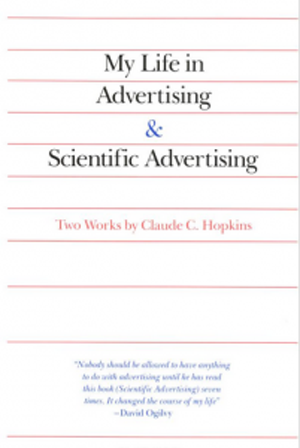Allow me to introduce you to one of my favorite people. Though long-dead, he’s still a total boss.
Ladies and gentlemen, please meet Claude Hopkins, whom I like to refer to as the Original Gangster of Advertising.
Claude Hopkins is the reason you use toothpaste.

He’s also the reason you use coupons. (And, if you send email newsletters, he’s the reason you have the option to do an A/B split test with different versions of your letter.)
Table of Contents
WHO THE F*** IS CLAUDE HOPKINS?
Our friend Claude was born in Michigan in 1866, and grew up working his face off as a school janitor, paper boy, and other various pursuits.
By working until 2AM in the morning every day of the week, Claude eventually ended up writing advertising for Bissell Carpet Sweepers (yep, the same Bissell vacuum cleaner company you’ve heard of).
From there, Claude snagged himself a position as advertising manager at Swift & Company–by asking every single client of his to write a recommendation and mail it to the person in charge of hiring.
THEN, he got his local newspaper to agree to publish a daily advertising column so he could show off his knowledge. He mailed all of the columns to the Swift & Company hiring manager. (Still think writing a cover letter is too much effort for a job application?)

Long story short, our boy Claude ended up managing advertising for Lord & Thomas (which you might know as FCB, or Foote, Cone and Belding–one of the world’s biggest ad agencies.
In 1923, Claude wrote a book called Scientific Advertising, which he followed up with an autobiography: My Life in Advertising. He’s a no-nonsense kind of guy with a lot to say.
Here’s Claude Hopkins’ best copywriting and advertising advice from both books. Bullet-point summaries in bold, courtesy yours truly.
1. HOW TO APPEAL TO PEOPLE
- Be trusting. “Try to hedge or protect yourself, and human nature likes to circumvent you. But remove all restrictions and say, “We trust you,” and human nature likes to justify that trust. All my experience in advertising has shown that people in general are honest.”
- Know your customer. “We cannot go after thousands of men until we learn how to win one.”
- Frame everything as a benefit. “Argue anything for your own advantage, and people will resist to the limit. But seem unselfishly to consider your customers’ desires, and they will naturally flock to you.”
- Don’t push too hard. “People can be coaxed but not driven. Whatever they do they do to please themselves.”
- Promise access to a secret. “Curiosity is a strong factor in human nature, and especially with women. Describe a gift, and some will decide that they want it, more will decide that they don’t. But everybody wants a secret gift.”
- Offer cures, not prevention. “People will do anything to cure a trouble, but little to prevent it.”
- Don’t be cheap. “We learn that cheapness is not a strong appeal. Americans are extravagant. They want bargains but not cheapness.”
2. HOW TO WRITE PERSUASIVELY
- Write plainly. “Successful salesmen are rarely good speech makers. They have few oratorical graces. They are plain and sincere men who know their customers and know their lines. So it is in ad-writing.”
- Write to one particular customer. “Don’t think of people in the mass. That gives you a blurred view. Think of a typical individual, man or woman, who is likely to want what you sell.”
- Spend more time on your headline. “The purpose of a headline is to pick out people you can interest…What you have will interest certain people only, and for certain reasons. You care only for those people. Then create a headline which will hail those people only.”
- Be specific. “The weight of an argument may often be multiplied by making it specific.”
- Pick a descriptive name. “Often the right name is an advertisement in itself. It may tell a fairly complete story, like Shredded Wheat, Cream of Wheat, Puffed Rice, Spearmint Gum, Palmolive Soap, etc.”
3. HOW TO AVOID WASTING MONEY
- Use space wisely. “Some advocate large type and big headlines. Yet they do not admire salesmen who talk in loud voices…[Large type] may not be offensive, but it is useless and wasteful. It multiplies the cost of your story.”
- You’re here to sell. “Do nothing to merely interest, amuse, or attract.”
- Instead of “buy one, get one,” offer a free sample… “Before a prospect is converted, it is approximately as hard to get half price for your article as to get the full price for it.”
- …but make them work for it. “Give samples to interested people only. Give them only to people who exbihit that interest by some effort. Give them only to people to whom you have told your story.”
- Imitate what works. “Before you use useless pictures, merely to decorate or interest, look over some mail order ads. Mark what their verdict is.”
- Sell to new prospects only. “In every ad consider only new customers. People using your product are not going to read your ads. They have already read and decided.”
- Track your returns. “Never be guided in any way by ads which are untraced. Never do anything because some uninformed advertiser considers that something right.”
- Know your customer’s financial situation. “We must learn what a user spends a year, else we shall not know if users are worth the cost of getting.”
- Budget for waste. “The cost of advertising largely depends on the percentage of waste circulation.”
Did I mention that Claude Hopkins published Scientific Advertising in 1923? Ninety-one years later, this man still knows more about successful, efficient advertising than most CEOs.
DO YOURSELF A FAVOR AND GET TO KNOW CLAUDE.
You can find copies of My Life in Advertising and Scientific Advertising online, but you should probably just buy it.

What do you think of Claude’s advice? Anything to add? Throw it in the comments.
About the author: Lianna Patch

The English Maven takes your content and makes it better. No content yet? She’ll write it.
Join me on theenglishmaven.com
This article was first published by Lianna Patch



